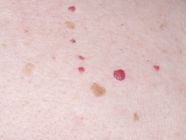While it's difficult to completely eliminate acne scars, today’s treatments can significantly reduce their appearance and help restore smoother, clearer skin.
Before starting any treatment, it’s essential to consult a dermatologist to assess the type and depth of your acne scars, as well as your skin type, in order to choose the most appropriate option.
Treating Acne Scars
Most cases require multiple treatment sessions, and dermatologists often combine different methods for better results. Treatment options include:
1- Topical Acne Scar Creams
There are many over-the-counter products available for mild scarring. These often include ingredients like: (1)(2)
- Azelaic acid (e.g., Skinoren cream), which helps reduce redness.
- Tretinoin creams (e.g., Acretin) to promote gentle exfoliation and skin renewal.
- Silicone-based creams or gels, often used to flatten and soften scars.
- Skin-lightening products, such as hydroquinone, to reduce dark spots left behind by acne.
2- Skin Resurfacing & Renewal Procedures
In-clinic procedures typically offer faster, more noticeable results and may include a combination of technologies tailored to your skin’s condition and the scar type. These work by removing the outermost layers of skin and stimulating collagen production. (1)(3)
1. Laser Resurfacing
Laser treatments such as fractional laser therapy target acne scars by removing damaged outer layers and boosting collagen production, encouraging the growth of smoother skin.
2. Chemical Peels
A chemical solution is applied to exfoliate and regenerate skin. Peels vary in strength and depth—light, medium, or deep—and are selected based on scar depth and skin sensitivity. Examples include:
- TCA Peel: For moderate to deep scars.
- VI Peel: Combines several acids (TCA, salicylic acid) to treat acne and scars simultaneously.
- Yellow Peel: Ideal for superficial discoloration and mild scarring.
- Smart Peel (PRX-T33): A modern peel that doesn't cause redness or visible peeling.
3. Microneedling (Dermapen)
This procedure uses fine needles to create micro-injuries in the skin, triggering collagen production and improving texture.
4. Radiofrequency Microneedling
An advanced version of traditional microneedling that combines tiny needles with heat from radiofrequency waves to deliver deeper skin remodeling. Popular devices include Secret RF, Vivace, Morpheus, and others.
5. Subcision
A minor surgical technique used for deep, sunken scars. It involves releasing the fibrous bands under the scar to raise it closer to the surface.
6. Other Treatments
Some injectable treatments can help improve acne scars, including: (1)(3)
- Platelet-Rich Plasma (PRP): Involves drawing a small amount of your blood, extracting the plasma, and injecting it back into the skin. When combined with other treatments, it can enhance scar improvement.
- Corticosteroid injections: Useful for thick or raised scars to flatten and smooth them.
- Dermal fillers: Temporarily fill deep depressions, lifting them to the surface and creating a more even skin appearance.
7- Biologics and New-Generation Therapies
In certain chronic or resistant cases—especially those accompanied by persistent inflammation—your dermatologist may recommend newer options like biologic medications (e.g., Dupixent) or JAK inhibitors (small-molecule therapies that target immune pathways).
These are typically reserved for complex cases and are only prescribed after thorough evaluation by a specialist.
A Final Word
If you're considering treating your acne scars, remember: great results require consistency and patience. These treatments offer real improvement, but work gradually by stimulating collagen or resurfacing the skin over time.
Here's why patience matters:
- Multiple sessions are needed: Treatments like microneedling, laser, or chemical peels require several sessions spaced weeks apart.
- Gradual improvement: These methods stimulate internal collagen regeneration, which can take weeks or months to become visible.
- Downtime is normal: Some procedures, like chemical peels or lasers, involve redness, dryness, or peeling during recovery.
- Commitment to skincare: Sticking to a good skincare routine—including prescribed creams and daily sun protection—helps maximize and maintain your results.
We recommend consulting with one of the skilled dermatologists at Al-Ahli Hospital, where you’ll find advanced technology and expert care to help you regain healthy, radiant skin. Book your appointment easily online now.
References
- American Academy of Dermatology Association - Acne scars: Consultation and treatment
- WebMD - Acne Scars
- Cleveland Clinic - Acne Scars
- NHS - Complications - Acne






